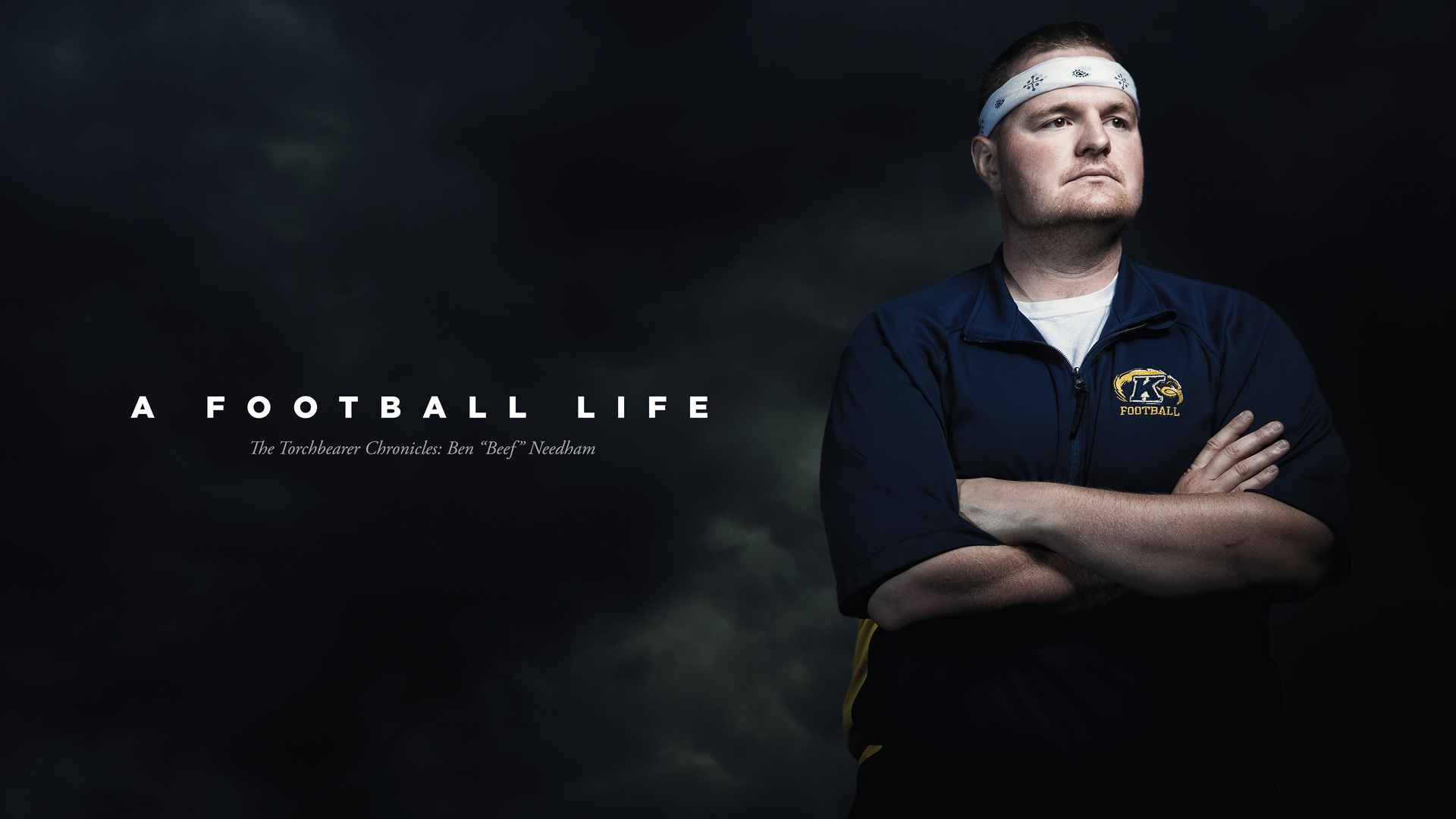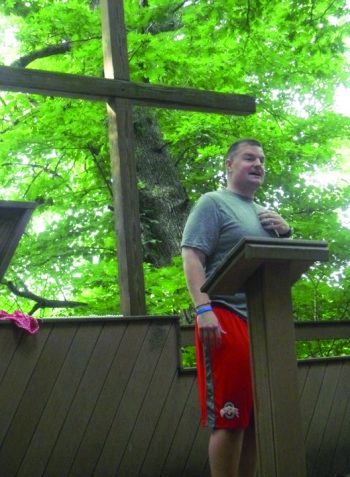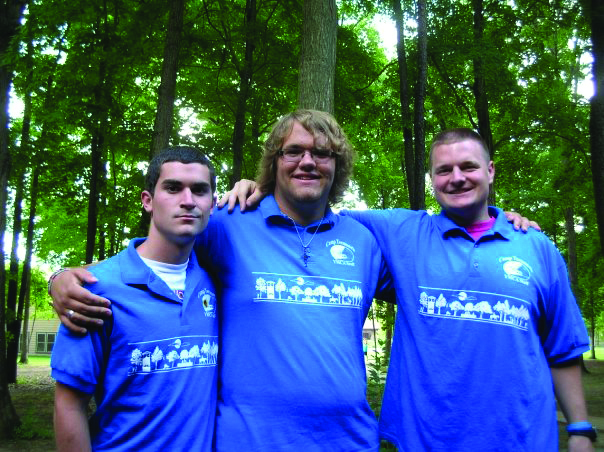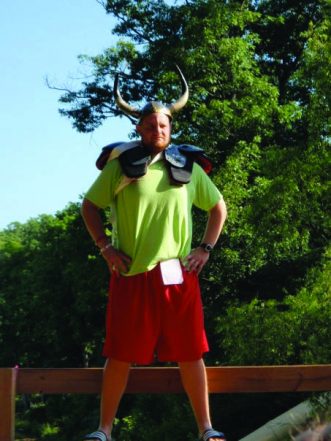In households across the country, Saturday is reserved for football. As Wally Butts once joked, “In Alabama, an atheist is someone who doesn’t believe in Bear Bryant.” In 2013, the 50 largest college football teams generated over $4.5 billion in total revenue and of the largest sports stadiums in the world, 13 of the top 20 are dedicated to the Saturday sport. As college football grows in popularity, raking in revenue from apparel, broadcast agreements, ticket sales, and advertisers, it churns out spectacle for students, boosters, alumni, and fans who expect to win, no matter the cost. But what of its participants? As the NCAA’s latest ad campaign cleverly states, for college athletes, “most will go pro in something other than sports.” Of the 15,000 college seniors who play football every year, only 300 will ever get the chance to earn a roster spot in the NFL, and even fewer will make the team. At this junction between academics and sport, the NCAA often finds itself nose to nose with scandal. Corrupt boosters, recruiting violations, player payment, dumbed down athlete curriculum, falsified testing information, improper gifts, and even some undisciplined criminal activity perfectly portray the schism between academic growth and the cutthroat mentality of, “just win, baby.”
The college football coach lives and dies at this intersection. They stake their careers, their fortunes, and their families on their ability to navigate this intersection. However, like the game of football itself, it’s not played alone. It’s the team of coaches together that must find their way. As such, the course of their life is rarely self-determined. Like a raft adrift in the ocean, all they can do is set a course and see what the tides will bear.
Few have navigated more turbulent waters than Ben “Beef” Needham. Two coaching scandals in subsequent years at two of the nation’s most prominent programs have taught him more about the cost of victory than most Saturday armchair quarterbacks will ever understand. His unyielding commitment to his players development, both on and off the field, and his overwhelming passion for the game paints a portrait of a man who understands that college football is more than just wins and losses. It’s a battle for the hearts and minds of those who play the game.
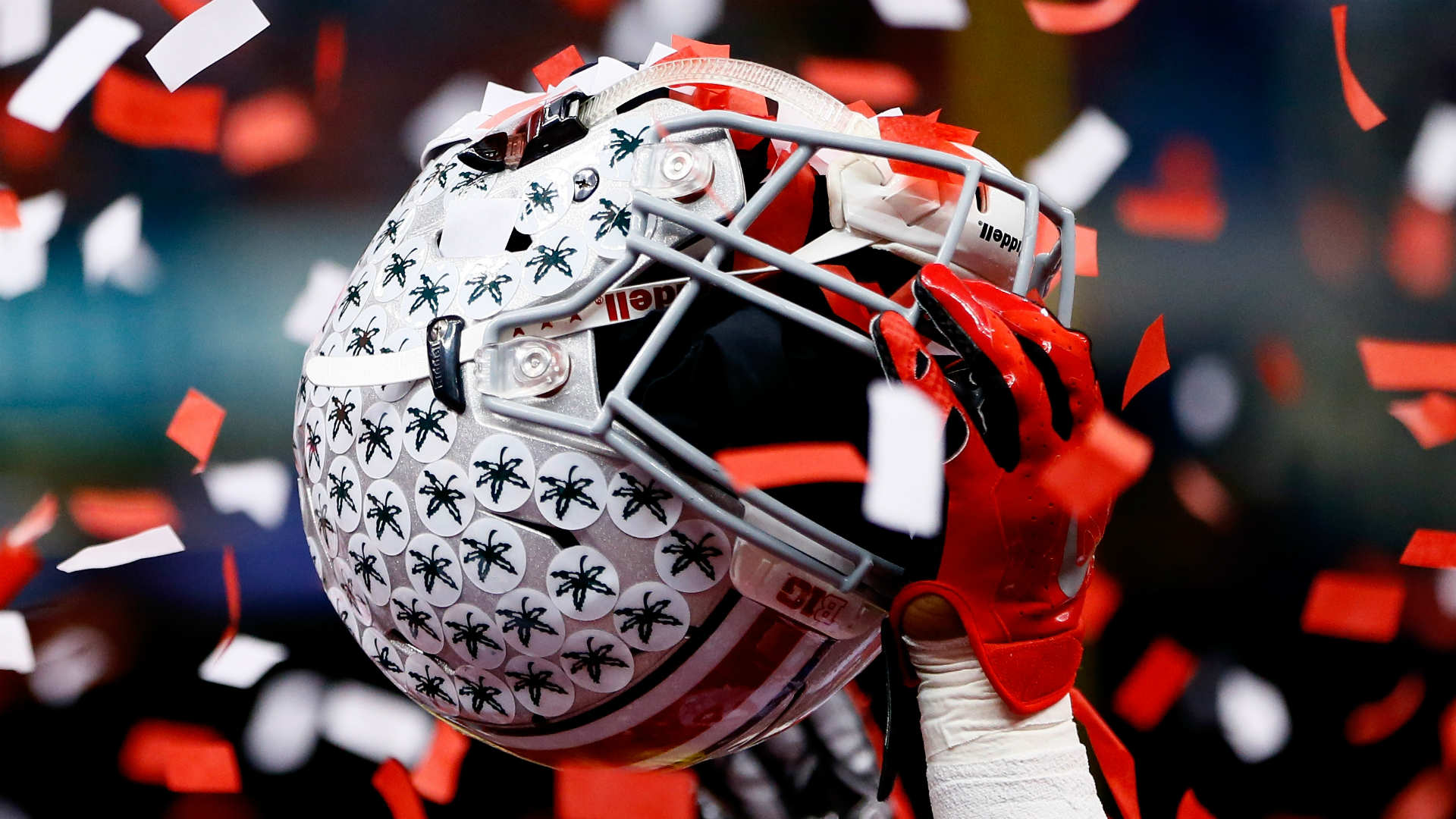
HOME BASE
This is my sanctuary. I feel like this is more of a home than anywhere else I go.
“Camp doesn’t just change lives. It saves lives.” The freshly minted summer staff nears tears as Beef bellows from the chapel stage. His roughhewn growl rumbles up the dirt paths and wooden benches of the chapel.
He’s wearing a sweatband, athletic shorts, and a too big white T-shirt with the word “undefeated” splashed across the chest in a blocky red and blue. “There’s a line in the sand that we draw at Tecumseh Bend Road” says Beef, eyes ablaze, voice crackling with fire, “where the problems of the real world aren’t allowed in. Since 1924 we’ve held that line.”
It’s nearing the end of staff training and Beef has been recruited to inspire the troops. A twenty year veteran of Camp Tecumseh, few know the life changing power of camp better than he.
Beef’s first taste of camp came in 1990 as a day camper. “I remember a counselor, Diedra. We had World Service Carnival and I lost my tickets running around and she gave me a handful of new tickets. When that happened I thought to myself, ‘These are the nicest people in the world. If I lost a candy bar at the store, nobody is giving me a new candy bar.’”
Beef returned every summer, and his love of camp grew. Between games of ultimate Frisbee, the groundwork was laid for his strong personal faith. “I became a Christian because of Camp Tecumseh, and I’ve been able to maintain some semblance of a Christian life because of camp. If I didn’t have camp, what path would I take?”
In 2002 Beef joined the Tecumseh staff as a day camp counselor. “When I was a kid, camp was Disney World. I had no idea how they did it. It was pure magic. On staff you see the sausage getting made. Tons of blood, sweat, and tears that go into it. It gave me a deeper appreciation for just what goes into this. Looking back now, my memories from camp are like, 85% counseling, and 15% camping.” Between 2004 and 2006, Beef joined the resident camp staff where he worked as a counselor, coordinator, and CILT counselor. “In 2006 when I was leaving, I’ve never cried that hard. I cried like a small child. I thought I would never be back.” Yet, every summer, Beef has made a return, even if it’s only for a few days. “This is my sanctuary. I feel like this is more of a home than anywhere else I go. I went off to college when I was 18. I’ve made 11 different stops in 11 years. When everything else changes, camp doesn’t. There is nowhere I’m more relaxed, more myself, or more at home.”
A FOOTBALL LIFE BEGINS
I loved the game. I loved the camaraderie. I loved the competition.
It shouldn’t be a surprise that the thundering rhetorician has found his calling in the locker rooms of the nation’s top college football programs. Immortalized by the likes of Bear Bryant and Lou Holtz, reinterpreted by Hollywood in our favorite sports movies, and dreamed about by every young kid whose ever stepped foot on a football field, few places are more guarded, more scrutinized, more revered than the vaunted halls of college football.
Beef’s football journey began in the fourth grade. Growing up in West Lafayette, Indiana Beef’s first love was basketball. “God has blessed me in a lot of ways, but not in athletic ability. However, if you’re a big kid, you had a place on the football team. I’ve never been a good player. I was always very average, but I loved the game. I loved the camaraderie, I loved the competition.” Beef played both sides of the line, and at the end of high school was recruited to play at DePauw by Bill Lynch. After two seasons Lynch left DePauw to take the offensive coordinator position at Indiana University, and Beef spent the month of January during DePauw’s J-term at Ohio State stapling, faxing, and copying his way to a student intern position the following semester. “That was a tough choice not to play anymore, but it’s hard to turn down Ohio State. I wasn’t a great player, and this would be a really good opportunity for me.”
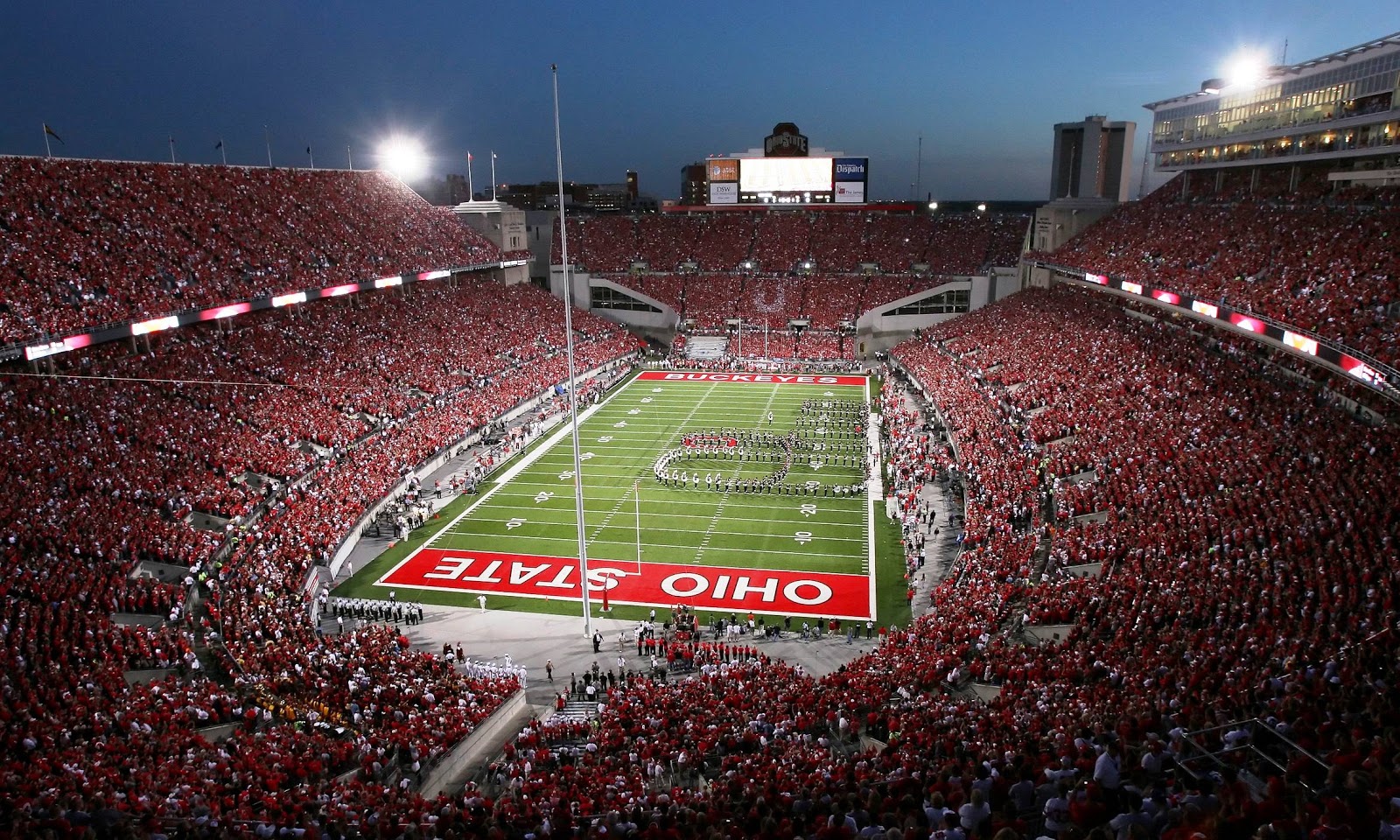
OHIO STATE
The three best leaders I know are my dad, Dave Wright, and Jim Tressel.
Few programs in the country carry the prestige, the history, the pride, and the expectation of Ohio State football. For a plucky student intern with coaching aspirations, the stage doesn’t get any bigger. “I had always revered college football, but I wasn’t under the illusion that everyone in it is a great guy. I thought I would be treated like dirt, having to earn my stripes. I was amazed at how well they treated me. From day one they were awesome.”
For a young coach, few things were more valuable than access. Ohio State attracts some of the biggest names in football. Celebrity visitors flock to Columbus, and special staff positions exist for friends of the University who don’t want to be part of the daily grind, but want to be close to the program. “Our academic enforcer was a 20 year NFL defensive coordinator. You could sit in the office with Dave Adolph, the defensive coordinator for the Raiders when they had Howie Long, and the Browns when they had two AFC championships. You could sit down and talk with John Gruden.”
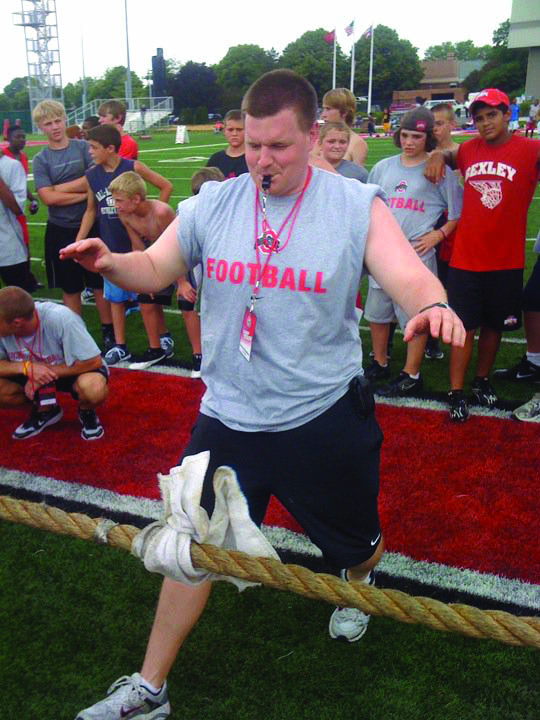
As a student intern on the defensive side of the ball, Beef answered directly to legendary defensive coordinator Jim Haecock, and he made it a point to learn as much as possible. “He’d be in watching film at 4am and I decided I was going to watch film with him every day. That was his quiet time, but he let me do it. After a while he’d sit there and start saying ‘What do you think about this call?’ The more we watched, the more he started talking out loud. I doubt my opinion carried any weight, but it was cool that he treated me that way. If he had said, ‘This is my time and my space’ I would have understood, but he didn’t. That left a big impression on me.”
The biggest lesson Haecock could teach, was the gravity of the job, and the level of detail necessary to do it well. “He worked so hard. At the end of the 2006 season we lost the national championship game to Florida. Until I left Ohio State in late June of 2007, we watched that film every day. It would be a great day of spring ball, and after everything was done and people would go home, we would sit and watch the Florida film for an hour. We had it memorized by then. The amount of importance had an influence. This is how seriously you have to take it.”
While Haecock was busy mentoring Beef on the art of defense and hard work, Jim Tressel was giving Beef lessons in the art of leadership. “The three best leaders I know are my dad, Dave Wright, and Jim Tressel. Tres knew the name of everyone in that building, and everyone had a job. We had a 1st down after a missed field goal and I tallied it up. The first time I did that, I’m setting the report on his desk and getting out of there, not even looking. After the 2nd or 3rd time, he would call me in and ask to talk to me about it. He was always in high demand so you wouldn’t go into his office to shoot the breeze, but if you ever needed anything, Tres was on it. He didn’t big time anybody.”
On the coaching front, the mystique of big time college football slowly lost its reverent status and became the new normal. “I remember how normal these guys are. The perception of football players is that they are all tough and hard headed. It’s not like that at all. The cross section of a football team isn’t much different the cross section of college male kids. We have great workers and lousy workers, and interests across the board.” In many ways the coaching job is similar to instructing clinics at camp. “It’s a bit like teaching a kid a forehand throw in ultimate. At first it’s terrible, then it’s terrible some more, then it’s okay, and finally it’s great.”
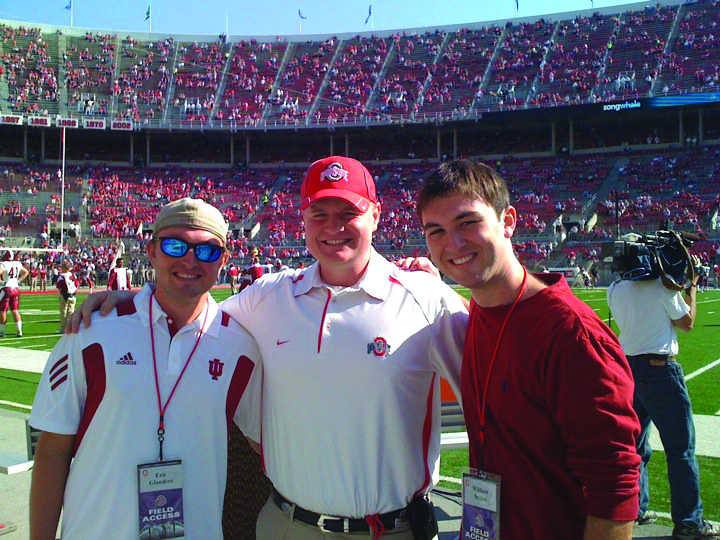
DRAKE
He is never going to play football again. He is going to jail.
In 2007, Beef graduated from Ohio State and got his first official coaching job as a graduate assistant at Wabash. After that he spent two years at Drake where he learned firsthand the immense, impactful power a coach can yield.
The first week of the season, Beef received a voicemail from Drake’s head coach Chris Creighton. One of his players had been found intoxicated and indecent in the the lobby of the psychology building. When the police came, he threw a metal bench through the front window panes. It took seven officers and two tasers to finally subdue him. “I kept thinking to myself, ‘He is never playing football again. He is going to jail.’” Because it was his first offense, he avoided jail time but was put on probation and required to do community service. “I sat him down and we had a conversation. I told him he couldn’t drink. Period. We came up with a plan and he would stop drinking for a year cold turkey. Knowing how tough it would be for him, I wanted to give him support. I decided to give up eating meat for a year. After that the team got in on it. They started giving things up. It was like Lent, but for football, and for an entire year.” The support Beef and the team offered worked. To this day, he has never had another drink. “When you look back on coaching, you win some games, and lose some games. That comes and goes. With him, that was pretty cool. He still calls, checks in, and lets me know how he’s doing.
A BREWING STORM
there was a lot of anger, and it wasn’t just because they fired Tres.
In 2010, Beef returned to Ohio State. In September, the storm arrived.
Terrell Pryor, Ohio State’s quarterback, and four other players had an arrangement in place to trade merchandise for tattoos at a parlor in Columbus under investigation by the FBI. In April of 2010, Coach Tressel had been informed of the breach in NCAA rules, but failed to notify Ohio State. In December, the Department of Justice called, wondering if the memorabilia seized from the tattoo parlor had come from the football program directly. After all, championship rings are hard to come by. Tressel denied having any knowledge of the memorabilia, but a week later exchanged text messages with the attorney who had originally brought the matter to Tressel’s attention. He verified that the Justice Department’s inquiries involved the players and memorabilia addressed back in April.
In March of 2011, Ohio State fined Tressel $250,000 and suspended him for two games for failing to notify the school of NCAA violations. In the following month, amidst mounting public pressure and NCAA accusations of withholding information and lying to keep players on the field, Tressel resigned as head coach.
There’s a stark difference between the perceptions the media paint concerning an event, and how events are viewed internally. Inside the locker room there was a lot of support for Tres. “Luke Fickell, the co-defensive coordinator and assistant head coach came over and told me there was a staff meeting the following morning at 6am. We all knew. We didn’t have to ask. There was a lot of anger, and it wasn’t just because they fired Tres. It was the timing of it, the administration’s role in it. It was Sunday night of Memorial Day weekend. Because Ohio State is always in a bowl game players don’t get to go home for Christmas. This was one of the only times players had a chance to go home. Nobody was there for the final meeting. None of the players were there to say goodbye. Throughout the process, the person who handled it best was Coach Tressell. We were calling him, texting him, and writing him, and the whole time he kept reassuring us that everything would be okay. He kept telling us it was time to move forward. That really reinforced what a good leader he is.” When Ohio State played Michigan the following year, they snuck Tressel back as a special captain. “There wasn’t a dry eye in the locker room from the kids. They loved that man because he loved them.”
The following season, the administration hired Luke Fickell to be head coach for the season. While he wasn’t going to change the staff, the writing was on the wall. “We knew we weren’t the University’s first choice. Unless we forced them to retain us by going 11-1 or 12-0 we were going to be gone.” In November, Ohio State hired Urban Meyer to coach the Buckeyes, but there was still a bowl game to be played on January 1st against Florida. “It was very awkward. There were two staffs trying to coexist. Awkward is as nice as it could get. There were a lot of hurt feelings. In total, Meyer kept two guys from that staff. I probably could have stayed on but two months was enough to know I didn’t want to be there.”
In the midst of the turmoil, Paul Hayes, Ohio State’s secondary coach received the defensive coordinator position at Arkansas. “Hayes was great with the coverage side, but didn’t have as much experience with the lineman and linebackers. He knew I had sat with Haecock for forever. He called me after our bowl game and told me there would be some changes. I took the job as a defensive tackles coach at Arkansas.”
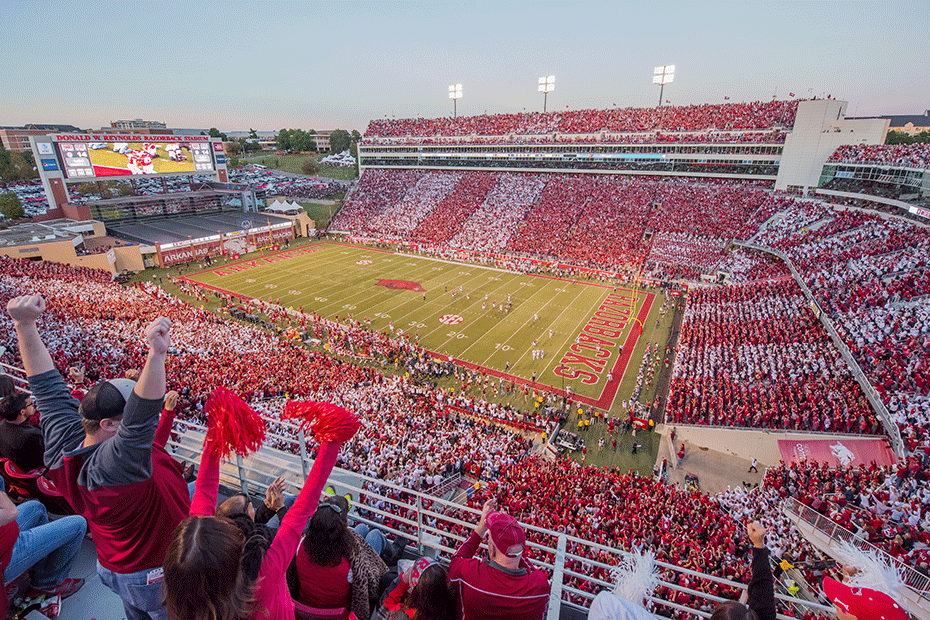
OUT OF THE FRYING PAN, INTO THE FIRE
The cumulative GPA for the defense was 1.8.
Beef had navigated from one storied program to another. As Ohio State was reeling from NCAA sanctions and coaching transitions, Bobby Petrino was building something special at Arkansas. Led by Ryan Mallett, a rocket armed quarterback, Petrino’s Razorbacks had become a contender in the nation’s toughest football conference, the SEC. “Petrino could do no wrong in the outside world because he was winning so many games.” However, his coaching style stood in direct contrast to what Beef had been accustomed to with Jim Tressel.
Arkansas exposed Beef to a much different side of NCAA football. “At Ohio State I was dealing with pretty easy issues: ‘I can’t believe they put me in that math class.’ ‘My girfriend is cheating on me.’ Issues sure, but they are college issues. At Arkansas it was different. The cumulative GPA for the defense was 1.8, with many players having no interest in class. Some players were skirting around NCAA violations trying to support themselves and others were failing in house substance detection tests.
Not a month into Beef’s employment, Petrino was in a motorcycle accident. Petrino initially said he was alone. However, minutes before a police report was to be released indicating another passenger, Petrino admitted to an improper relationship with an Arkansas volleyball player who served as his student-athlete development coordinator. He was fired two weeks later. “We finished out spring ball with no head coach. We didn’t know if we would make it to the season or if we would be replaced. Eventually John Smith, the special teams coach got hired and he kept me on, but it was deja vu all over. 11-1 or 12-0 or we would be all moving on.”

KENT STATE
Talent is tertiary. It’s all about how well you develop kids.
There is no such thing as a sure thing in the world of college football. Every job, every moment, every opportunity is earned. However, once the mythos and grandeur of college football has deteriorated, what’s left is a dedicated group of men, grinding out impossible hours to support their family in an industry where job security is a myth. “It’s really hard to see coaches go through transition. You get close to them and their families, their kids. Even though it’s tough to see, nobody ever talks about it. Nobody ever talks about throwing in the towel.”
After that season Paul Haynes took the head coaching job at Kent State, and Beef followed. “I’m the linebackers coach and recruiting coordinator. Any job you get in football, you are lucky to have it. Although all football situations are volatile, this feels more settled than the last few years. I want to stick around and build something here. I want to see something come to fruition.”
While many think of climbing the career ladder in their respective field, Beef’s football journey has given him a different perspective. “I used to think if I do a good job here for a few years I can be a coordinator. Have a few good years as a coordinator, then I can be a head coach. The first staff meeting at Kent State was a huge wake up call. Dave McMichael sat next to me. He’s 63 and he’s a position coach just like me. He worked at West Virginia for 25 years and won a national championship. He spent 10 years at Connecticut. You have all these grandiose plans, but it’s not totally up to your job performance. In big time, BCS programs, if the head coach retires or moves on without taking you with him, you’re back to square one. You can’t get too full of yourself. There are a lot of unemployed coaches.”
At camp, Beef has always abided by a kid’s first attitude and it sticks with him when coaching. “My goal is to win enough games to stay employed to get to be around the kids. I’ve counseled every kind of kid from day campers through CILTs, to a kid being recruited to play football, to college seniors. As a coach, I can have a huge impact on a kid and that’s what’s fun about it, challenging about it, and ultimately the impetus behind it. I’m around these kids at a pivotal stage.”
For a young football player, few things are more valuable than coaching. “Arkansas taught me that talent is tertiary. It’s so far on the backburner of what it takes to win. It’s all about how well you develop kids and coach kids. Kent State has more offensive linemen drafted and still playing in the NFL.”
However, there is so much more to coaching than the game of football. “I have 10 linebackers that sit in the linebacker room with me. What’s the difference between that and devotions? All of them are fighting difficult battles. All of them have things they are working on. It’s so rewarding when they call you, come to your office, or text you when they have a problem. They are doing the right things when we hear from them. When we don’t hear from them, we have to ask ourselves, where is the relationship broken?”
Many of those relational abilities that Beef relies on daily come directly from his experience at camp. “I don’t think I’d be nearly as good a coach, without the experience of being a counselor. When the freshmen come to campus it’s the same as that Brave camper coming to camp. They are wide-eyed and they don’t know much, but they are so excited. Camp taught me a ton about building genuine relationships both with peers, and with folks you are helping and mentoring. That helps with coaching side of it and it’s a huge part of recruiting.”
In and of itself, college football isn’t important. For the vast majority of us, it’s an entertaining distraction. Too often our lust for victory encourages the ruthless tactics employed by coaches bent on victory no matter the cost, blinding us to the benefits received by the vast majority of players. For some, college football is a way out of bad homes and bad neighborhoods. It’s an opportunity for an education. It’s an opportunity to meet a diverse, eclectic group of young men. It’s a chance to be a part of something. More than anything, it’s an opportunity to have mentors like Beef, who can lay a solid foundation from which kids can build purposeful, professional lives. Years ago, Camp Tecumseh played a role in laying the foundation for the person Beef has become. Now, Beef lays that same foundation for the players coming through his locker room.
This article was originally published in the Fall of 2014.

